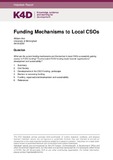| dc.contributor.author | Avis, William | |
| dc.coverage.spatial | Various countries | en |
| dc.date.accessioned | 2022-07-18T06:50:03Z | |
| dc.date.available | 2022-07-18T06:50:03Z | |
| dc.date.issued | 2022-05-06 | |
| dc.identifier.citation | Avis, W. (2022). Funding Mechanisms to Local CSOs. K4D Helpdesk Report No. 1136. Institute of Development Studies. DOI: 10.19088/K4D.2022.089 | en |
| dc.identifier.uri | https://opendocs.ids.ac.uk/opendocs/handle/20.500.12413/17546 | |
| dc.description.abstract | Civil society can be broadly defined as the area outside the family, market and state. As such, civil society encompasses a spectrum of actors with a wide range of purposes, constituencies, structures, degrees of organisation, functions, size, resource levels, cultural contexts, ideologies, membership, geographical coverage, strategies and approaches.This rapid literature review collates available literature on funding mechanisms and barriers to local CSOs gaining access to funding and the extent to which funding leads towards organisational development and sustainability. Broadly, it is asserted that in terms of funding, local CSOs often struggle to secure funding equivalent to that of INGOs and their local representatives. Kleibl & Munck (2017) reflect that indigenous non-state actors do not receive large shares of development funding. For example, only 10% of the total funding for US-funded health projects in Uganda was allocated to indigenous non-state actors.Given the diversity of CSOs and the variety of contexts, sectors they work in and the services they supply, it is challenging to summarise funding mechanisms available to local CSOs and the barriers to accessing these. Recent analyses of CSO funding report that while the total CSO funding in many contexts has continued to increase in absolute terms since 2015, its relative importance (as a share of total Overseas Development Assistance) has been decreasing (Verbrugge and Huyse, 2018). They continued that ODA funding channelled through CSOs (i.e., funding that is programmed by the donor government) remains far more important in volumes than ODA channelled directly to CSOs (which is programmed by CSOs themselves).The literature identifies three principal mechanisms by which donors provide financial support to civil society actors: a) Direct support to individual or umbrella organisations; b) Via Southern government; c) Via Intermediaries – largely Northern NGOs. | en |
| dc.description.sponsorship | Foreign, Commonwealth and Development Office (FCDO) | en |
| dc.language.iso | en | en |
| dc.publisher | Institute of Development Studies | en |
| dc.relation.ispartofseries | K4D Helpdesk;1136 | |
| dc.rights.uri | https://www.nationalarchives.gov.uk/doc/open-government-licence/version/3/ | en |
| dc.subject | Aid | en |
| dc.subject | Development Policy | en |
| dc.title | Funding Mechanisms to Local CSOs | en |
| dc.type | Helpdesk | en |
| dc.rights.holder | © Crown copyright 2022 | en |
| dc.identifier.doi | 10.19088/K4D.2022.089 | |
| dcterms.dateAccepted | 2022-05-06 | |
| rioxxterms.funder | Default funder | en |
| rioxxterms.funder | Department for International Development, UK Government | en |
| rioxxterms.identifier.project | K4D | en |
| rioxxterms.identifier.project | K4D | en |
| rioxxterms.version | VoR | en |
| rioxxterms.versionofrecord | DOI: 10.19088/K4D.2022.089 | en |
| rioxxterms.funder.project | 42a141a4-4b80-406f-9c57-3bb186f136c1 | en |
| rioxxterms.funder.project | 238a9fa4-fe4a-4380-996b-995f33607ba0 | en |

